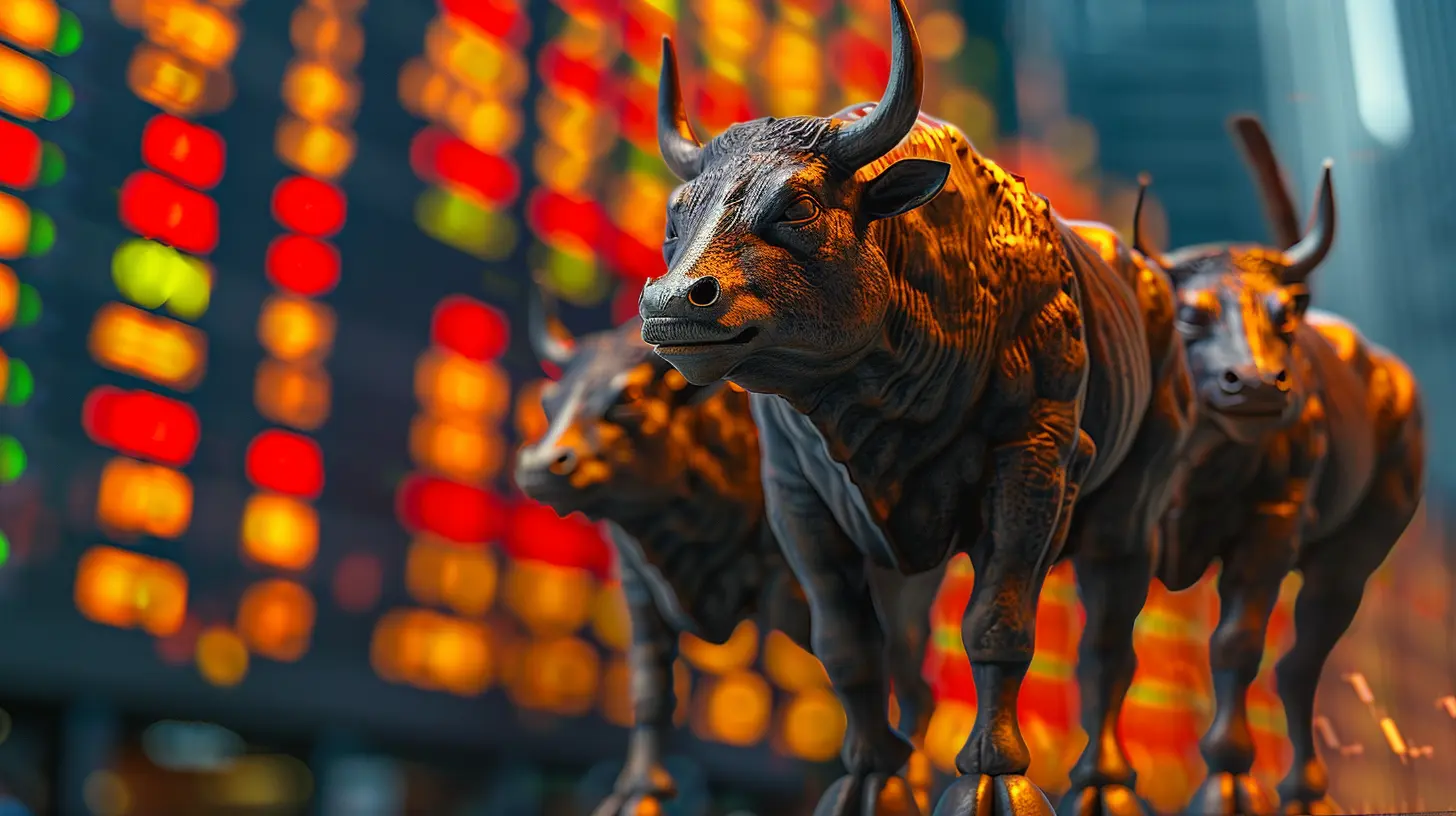The Benefits of Dividends in a Market Downturn
15 September 2025
Most investors love seeing their portfolios climb. Green ticks, upward trends, and portfolio gains feel like a gentle breeze on a sunny day. But markets don’t always go up. When they start to dive—like in a recession or during financial uncertainty—panic sets in. Stock prices tumble, and most investors feel like they’re standing in a financial storm without an umbrella.
But here’s the silver lining: dividend-paying stocks. During a market downturn, dividends can act like a safety net. They won’t stop the rain, but they can give you an umbrella and maybe even a cup of coffee to ride out the storm.
Let’s dive into how dividends can be a powerful ally when the market is taking a hit, and why you might want to pay more attention to those regular cash payouts.
What Are Dividends, Really?
Before we get into why dividends matter during downturns, let's get on the same page.A dividend is basically a company’s way of saying, “Thanks for sticking with us.” When a company has extra profit, instead of reinvesting all of it back into the business, they sometimes share a piece of the pie with shareholders. That slice of profit is the dividend.
These payments usually come quarterly, but some companies do it monthly or annually. They can be cash payouts or additional shares. Think of them as rent money your shares are earning while they sit in your portfolio.
The Stock Market Rollercoaster: Why Downturns Happen
Stock markets go up and down all the time. But during significant drops—like the 2008 financial crisis or the 2020 pandemic crash—investors often find themselves scrambling. Valuations fall, fear creeps in, and many start selling off their assets.But abandoning ship isn’t always the best move. Timing the market is notoriously difficult, and emotional decisions can lead to missed rebounds. That’s where dividends offer something invaluable during turbulent times: income that doesn’t depend on stock prices rising.
1. Steady Income Regardless of Market Conditions
One of the biggest perks of dividend-paying stocks is the income stream they provide—rain or shine.When stock prices dip, the companies still distributing dividends are essentially handing out cash even while the market is moody. That’s crucial if you’re a retiree depending on investment income or simply need a psychological win during a tough financial spell.
Sure, in extreme downturns, some companies cut or suspend dividends. But many of the well-established, dividend aristocrats (think: Coca-Cola, Johnson & Johnson, Procter & Gamble) have long histories of paying and even increasing their dividends through recessions.
👉 Think of these as the friend who shows up with pizza even when everything else is falling apart.
2. Dividend Payments Hedge Against Inflation
During downturns, central banks often lower interest rates to stimulate the economy. While that might make borrowing cheaper, it can also drive inflation. Suddenly, your cash is worth a bit less than before.Here’s where dividends swoop in again. A stock that pays, say, a 4% annual yield may help offset the purchasing power you’re losing elsewhere. It's not perfect inflation protection, but it’s much better than holding cash in a zero-interest savings account.
3. Reinvesting Dividends = Compound Growth
Reinvesting dividends during a downturn might seem counterintuitive—why put more money into a tanking market? Because you can buy shares at a discount.Let’s say you receive a $100 dividend and reinvest it while the stock price is low. You pick up more shares than you would have at a higher price. Fast forward a few years and when the stock climbs again, you now own more of a stock that’s worth more. That’s compounding in action.
It’s like planting seeds during a storm, knowing the sunshine WILL come.
4. Lower Volatility = Smoother Ride
Dividend-paying stocks tend to be more stable than their non-dividend peers. Why? Because the companies that dish out regular dividends are usually mature, well-established, and more financially disciplined.During market corrections, these companies generally don’t see the wild swings that growth stocks do.
It’s like comparing a seasoned sailor to a teenager with a new boat when the waves hit. One panics, the other adjusts the sails and keeps on course.
Dividend stocks are that seasoned sailor.
5. Investor Confidence & Market Psychology
Markets run on human emotion just as much as on data—fear, greed, hope. When companies continue paying dividends during tough times, it sends a psychological message: “We’re stable. We’ve got this.”This confidence ripples out to investors. Even when portfolios are in the red, seeing a dividend hit your account can be the reminder you need to stay calm.
It’s like getting a paycheck while job hunting—you might not be where you want to be yet, but you’re not broke either.
6. Protection Against Total Loss
Let’s be real—no investment is immune to downturns. Even dividend stocks can lose value. But that dividend income? That’s actual money in your account.It can soften the blow. If you’re down 10% on stock value but received a 4% dividend yield that year, your overall loss is more manageable.
That’s better than watching your growth stock plunge 30% with no payout in sight.
7. Encourages Long-Term Thinking
Dividends have a magical side effect—they make you more patient.When you know you’ve got income flowing in every few months, you're less likely to sell at the first sign of trouble. You begin to think like a business owner, not a day trader.
And guess what? Many of the wealthiest investors—Warren Buffett, for example—built their fortunes on exactly this kind of thinking.
Own good companies. Hold them for a long time. Let those dividends do their thing.
8. Tax Benefits (In Some Places)
Depending on where you live, dividends can come with tax perks. In the U.S., for instance, “qualified dividends” are taxed at a lower rate than ordinary income.Compare that with interest from bonds or savings accounts, which gets taxed like regular income. That extra few percent in tax savings adds up over time—especially when markets are underperforming.
So your dividend dollars may stretch further than you think.
9. Easier Retirement Planning
If you’re retired—or planning to be—dividend income brings consistency.Markets are unpredictable, and selling shares during a downturn to fund your lifestyle is risky. You might lock in losses or run out of money faster than planned.
But with dividends, you can structure a retirement plan where income keeps coming in without having to sell anything at a loss. This kind of predictability makes budgeting during volatile times a lot less stressful.
It’s like having a pension that you control.
10. Compounding Confidence
When markets are falling, pessimism runs high. It’s easy to lose faith in your investments, or even in the idea of investing itself.But dividends keep working for you—silently, steadily.
When you reinvest dividends, your share count goes up. When share prices recover, your larger position is worth even more. This cycle builds confidence, even when stock prices are a mess.
And confidence is priceless in a downturn.
What to Watch Out For
Okay, quick reality check.Not every dividend stock is a gem. Some companies offer high yields because their stock prices have dropped significantly—often for good reason. These are called “dividend traps.” It’s the investing version of seeing a “Free Candy” sign on a mysterious, unmarked van.
So what should you do?
- Stick with companies that have a consistent dividend history.
- Look for payout ratios that are sustainable (generally under 60–70%).
- Pay attention to the company’s overall financial health.
- Consider ETFs that focus on dividend-paying stocks if you don’t want to handpick.
Final Thoughts: Dividends Are the Unsung Heroes in a Downturn
When the market is shining, it's easy to overlook dividends. Everyone’s chasing the next Tesla or Amazon. But when things get rough, dividend-paying stocks can feel like a lighthouse in a stormy sea.They provide income when your portfolio doesn’t. They encourage patience when panic calls. And they can build serious wealth over time, especially when reinvested.
So the next time the market hits a speed bump—or a full-blown crisis—ask yourself:
Are my stocks working for me even when times are tough?
If they pay dividends, chances are, they are.
all images in this post were generated using AI tools
Category:
Dividend StocksAuthor:

Uther Graham
Discussion
rate this article
1 comments
Ariadne McCoy
Dividends in a downturn are like a warm blanket on a cold night—comforting and surprisingly cozy! While stocks may be shivering, those reliable payouts keep your spirits high. It’s like getting a snack during a scary movie; you know you’ve got something good to hold onto!
September 26, 2025 at 4:00 AM

Uther Graham
Thank you! I love that analogy—dividends really do provide comfort and stability when markets get chilly!


